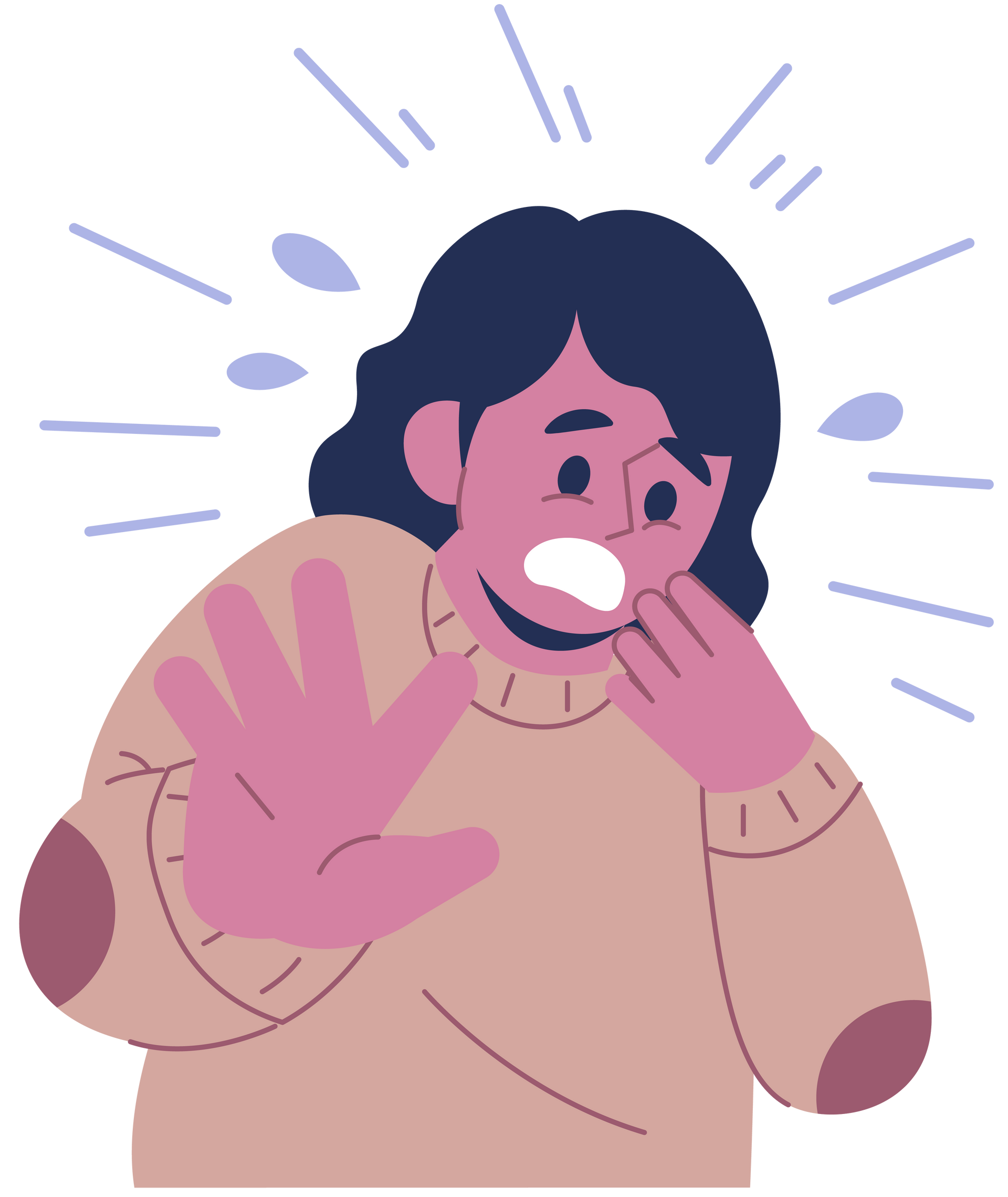PTSD and Trauma Treatment at Modern Psychiatry
Healing from Trauma is Possible
Living with the aftermath of trauma can feel like carrying an invisible weight that no one else can see or understand. Maybe you're having flashbacks that make you feel like the traumatic event is happening all over again. Perhaps you're avoiding places, people, or situations that remind you of what happened. You might feel disconnected from the people you love, struggle with sleep, or find yourself constantly on edge, waiting for the next bad thing to happen.
If this sounds like your experience, you're not alone. Trauma affects millions of people, and it's not a sign of weakness or something you should just be able to "get over." At
Modern Psychiatry, we understand that trauma changes how your brain and body respond to the world, and we're here to help you heal and reclaim your life.
Understanding Trauma and PTSD
Trauma can result from many different types of experiences. It might be a single incident like a car accident, assault, or natural disaster, or it could be ongoing experiences like childhood abuse, domestic violence, or military combat. Sometimes trauma comes from witnessing something terrible happen to someone else, or even from learning about traumatic events that happened to people close to you.
Not everyone who experiences trauma develops PTSD, but many people have some trauma-related symptoms that affect their daily life. PTSD is diagnosed when symptoms persist for more than a month and significantly interfere with your ability to function.
Common PTSD symptoms include intrusive memories or flashbacks where you feel like you're reliving the traumatic event, nightmares or disturbing dreams, severe emotional distress when reminded of the trauma, and physical reactions like rapid heartbeat or sweating when something triggers a memory.
You might also experience avoidance symptoms, like staying away from places, people, or activities that remind you of the trauma, or avoiding thoughts and feelings related to the traumatic event. Many people with PTSD have negative changes in thinking and mood, such as feeling hopeless about the future, having trouble remembering important parts of the trauma, or feeling detached from family and friends.
Changes in arousal and reactivity are also common. This might show up as being easily startled, feeling constantly on guard, having trouble concentrating, or experiencing angry outbursts or self-destructive behavior.
Different Types of Trauma
Acute trauma results from a single incident like an accident or violent crime. The symptoms might start immediately or could be delayed for weeks or months after the event.
Complex trauma occurs when someone experiences multiple or prolonged traumatic events, often starting in childhood. This might include ongoing abuse, neglect, or living in a war zone. Complex trauma can affect development and lead to difficulties with emotional regulation, relationships, and self-concept.
Historical trauma affects entire communities or groups of people and can be passed down through generations. Examples include the trauma experienced by survivors of genocide, slavery, or systematic oppression.
Secondary trauma can affect people who work with trauma survivors, like first responders, healthcare workers, or therapists. Hearing about traumatic events repeatedly can lead to symptoms similar to PTSD.
How We Approach Trauma Treatment
Healing from trauma is absolutely possible, but it requires specialized treatment approaches that address both the psychological and physical effects of trauma. At Modern Psychiatry, we use evidence-based treatments that have been proven effective for trauma and PTSD.
Trauma-Focused Cognitive Behavioral Therapy (TF-CBT) helps you process traumatic memories and change negative thought patterns that developed after the trauma. This approach teaches you coping skills and helps you regain a sense of control over your thoughts and reactions.
Eye Movement Desensitization and Reprocessing (EMDR) is a specialized therapy that helps your brain process traumatic memories in a new way. During EMDR sessions, you'll focus on the traumatic memory while engaging in bilateral stimulation, usually through guided eye movements. This helps reduce the emotional intensity of traumatic memories.
Prolonged Exposure therapy involves gradually and safely confronting trauma-related memories and situations you've been avoiding. This helps reduce the power these memories have over your life and allows you to reclaim activities and experiences you've been missing.
Cognitive Processing Therapy focuses on helping you understand how trauma has affected your thoughts about yourself, others, and the world. You'll learn to identify and challenge unhelpful thoughts and develop more balanced, realistic thinking patterns.
Addressing the Whole Person
Trauma affects more than just your mind – it impacts your entire body and nervous system. That's why our treatment approach addresses both psychological and physical aspects of trauma recovery.
We might incorporate mindfulness techniques, breathing exercises, or other body-based approaches that help you develop a healthier relationship with physical sensations and emotions. Learning to regulate your nervous system is an important part of trauma recovery.
If medication would be helpful, we can discuss options that might reduce symptoms like intrusive thoughts, nightmares, or hypervigilance. Medication isn't always necessary for trauma treatment, but it can be a valuable tool for some people, especially when combined with therapy.
We also recognize that trauma often affects relationships, so we might include family therapy or couples counseling as part of your treatment plan. Trauma can make it difficult to trust others or maintain close relationships, and healing often involves rebuilding those connections.
Creating Safety and Stability
Before diving into processing traumatic memories, it's important to establish safety and stability in your current life. This might mean addressing immediate safety concerns, developing coping skills for managing difficult emotions, or working on basic self-care and daily functioning.
We'll help you develop a toolkit of strategies for managing symptoms when they arise. This might include grounding techniques to help you stay present when you're feeling triggered, relaxation exercises to manage anxiety and hypervigilance, or communication skills to help you express your needs to supportive people in your life.
Building a strong support system is crucial for trauma recovery. We'll help you identify people in your life who can provide emotional support and practical assistance, and we'll work on developing healthy relationships that support your healing.
The Healing Process
Trauma recovery isn't linear – it's normal to have good days and difficult days, and healing often happens in waves rather than a straight line. Some days you might feel like you're making great progress, while other days might be more challenging.
It's important to be patient and compassionate with yourself during this process. Healing from trauma takes time, and everyone's timeline is different. Some people start feeling better within a few months of treatment, while others need longer to process their experiences and develop new coping strategies.
Throughout your healing journey, we'll be there to support you and adjust your treatment plan as needed. Recovery is possible, and with the right support and treatment, you can move beyond simply surviving to truly thriving.
Convenient and Safe Care Options
We understand that trauma can make it difficult to leave your home or travel to appointments, especially if you're dealing with hypervigilance or anxiety about being in new places. That's why we offer both in-person and telehealth options for trauma treatment.
If we have a physical location in your state, you can choose between meeting in person or having virtual appointments based on what feels safest and most comfortable for you. For states where we don't have offices, we provide comprehensive trauma treatment through secure telehealth platforms.
Many trauma survivors find telehealth appointments less stressful because they can participate from their own safe space without worrying about traveling or being in unfamiliar environments.
Frequently Asked Questions
Is it normal to not remember parts of my traumatic experience?
Yes, memory gaps are very common after trauma. Your brain may have blocked out certain details as a way of protecting you. These memories may return during treatment, or they may not, and both scenarios are normal. Treatment can be effective even if you don't remember every detail of what happened.
Will talking about my trauma make it worse?
It's natural to worry about this, but trauma-focused therapy is designed to help you process difficult memories safely. We go at your pace and use techniques that help reduce the emotional intensity of traumatic memories rather than making them more overwhelming.
How long will it take to feel better?
Everyone's healing timeline is different. Some people start noticing improvements within a few weeks, while others need several months or longer. The severity of the trauma, your support system, and other factors all influence recovery time. What's important is that healing is possible.
Can I heal from trauma without medication?
Many people recover from trauma through therapy alone. Medication can be helpful for managing specific symptoms like nightmares, depression, or severe anxiety, but it's not always necessary. We'll discuss all options and help you decide what feels right for you.
What if I was traumatized as a child but I'm just seeking help now as an adult?
It's never too late to heal from trauma, regardless of when it occurred. Many people don't seek help until years after their traumatic experiences, and treatment can still be very effective. Your brain's capacity to heal doesn't disappear over time.
You Deserve to Live a Life Free From the Grip of Trauma
Contact Modern Psychiatry today to take the first step toward healing and reclaiming your future.




